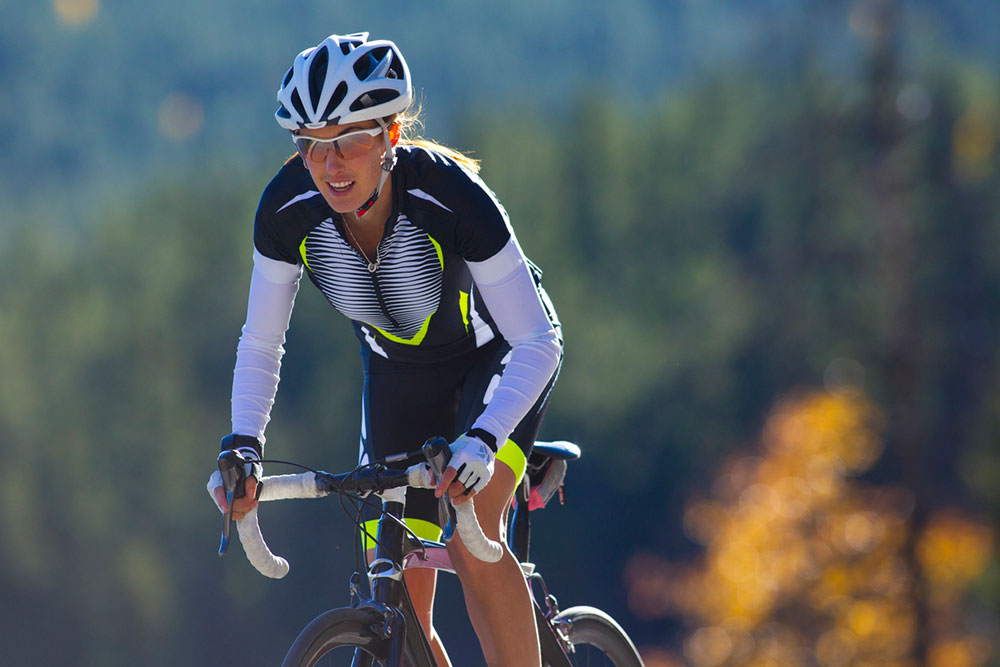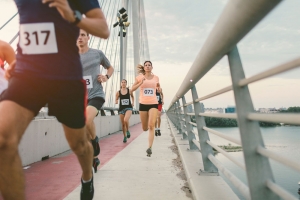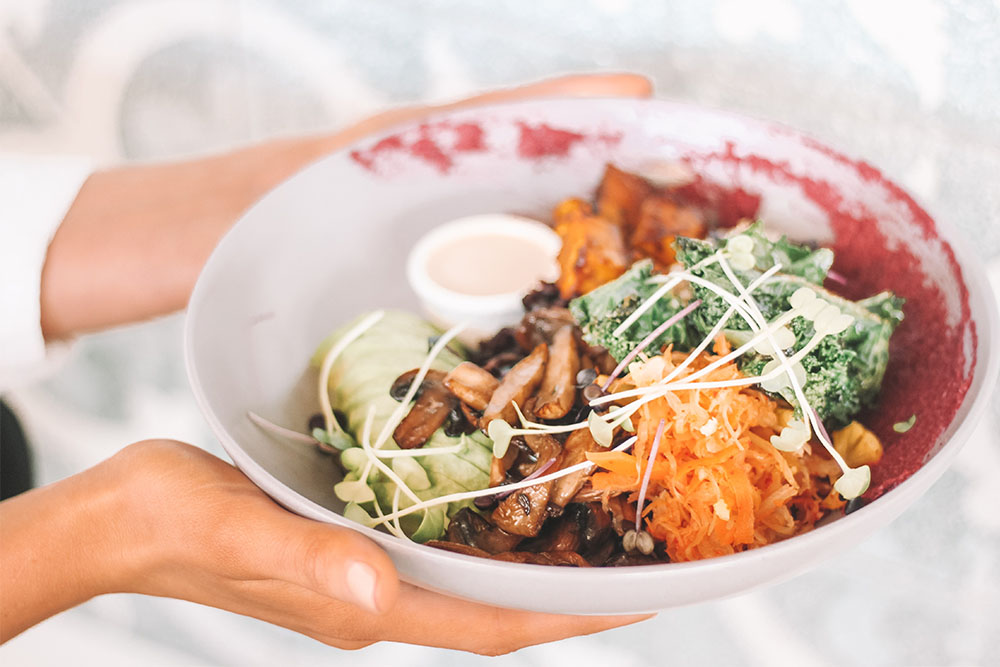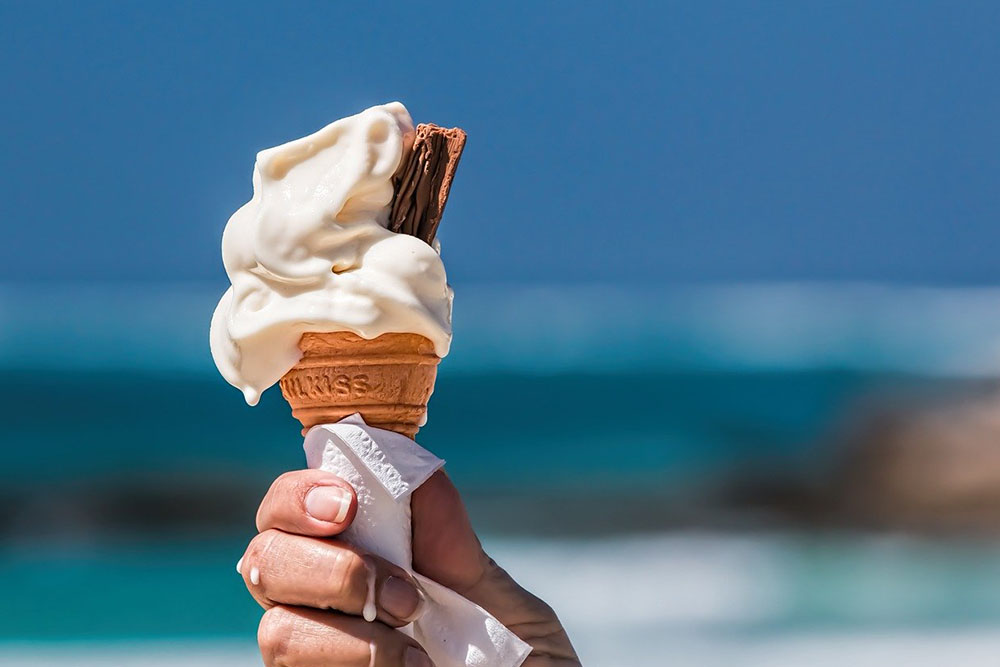Effect Of Gluten-Free Diet On Endurance Performance

Non-celiac Athletes
Approximately 70% of endurance athletes experience gastrointestinal distress during their event and it is estimated that a gluten-free diet may reduce these negative symptoms (Lis et al., 2015). Lis, Stellingwerf, Shing, Ahuja, & Fell (2015) examined the beliefs, experiences and popularity of a gluten-free diet in 910 athletes that ranged from recreational to Olympic. It was discovered that in 80.7% of the participants, the removal of gluten decreased physical symptoms of bloating, gas, diarrhea, and fatigue as reported in a questionnaire about the athlete’s experience with exercise and a gluten-free diet.
There is very limited evidence on the effects of a gluten-free diet on endurance performance in non-celiac athletes. Lis et al (2015) examined the effects of a gluten free diet in male and female competitive cyclists aged 18-40 with a minimum VO2 greater than 60 ml/kg-1/min-1 (male) and 50 ml/kg-1/min-1 (female). None of the participants were diagnosed with celiac disease.
Related Article: Precision Nutrition and You: Nutrigenomic Approaches To Disease And Health
The Maximal Test
A maximal test to exhaustion on the cycle ergometer was used to measure VO2max and peak power. A double-blind, crossover design was used to implement a gluten containing diet or a gluten free diet with a 10-day wash out period in between trials. A moderate 24-hour carbohydrate load was done before the test. It was discovered that there were no significant differences in work completed, power, heart rate, cadence, gastrointestinal symptoms, and plasma concentrations of cytokine and intestinal fatty acid binding protein (Lis et al., 2015). Authors concluded that following a gluten-free diet had no effect on performance, stress, or gastrointestinal distress.
Celiac Athletes
Commercially bought gluten-free foods are typically more energy dense compared to the gluten-containing products which requires making adjustments to the athlete’s dietary choices (Black, Skidmore, & Brown, 2012).
The Study
A case study was conducted with a 31-year-old female cyclist, who was diagnosed with celiac disease and was racing in an ultra-endurance 364km one-day race in New Zealand. Black et al. (2012) focused on changing the diet to incorporate more iron dense foods such as red meat and include an iron supplement. The athlete also incorporated gluten free bread, pasta and muesli bars to increase her carbohydrate intake. Rice crackers have shown to be an adequate substitute to regular bread in athletes with celiac disease (Black et al., 2012).
The athlete kept a constant body mass and reported feeling an increase in energy. The diet was created by a nutritionist that matched the energy, nutrient and hydration needs of the athlete to her previous gluten-containing diet. The athletes’ food tolerance was measured and foods that were well tolerated (rice crackers and gluten free breakfast cereal) were consumed pre-race to increase glycogen stores. Cream-cheese sandwiches, homemade banana bread, jelly beans, rice crackers, chocolate, and sports drinks were consumed during the event. This was the first event for the athlete since being diagnosed with celiac disease and she reported feeling lethargic and nauseous in the second half. It was also reported that the extra dryness of gluten-free foods increased drinking rate and made it more difficult to eat while cycling, making her less inclined to eat. The increased energy density of gluten free foods delays gastric emptying which can increase nausea and delay energy availability. Gluten-free foods are also less filling as they have low protein content, increasing the athletes hunger.
Black et al. (2012) stated that the athlete was 2 hours slower than expected due to the early onset of fatigue and insufficient energy intake. Other studies have stated that a celiac athletes’ performance may be compromised by increased fatigue, higher risk of anemia and stress fractures due to low bone density and vitamin deficiencies of iron, folate and fat-soluble vitamins (Keihanian, Burke, & Levey, 2010).
The Findings
 Recent research has found that following a gluten-free diet has been shown to reduce the intake of fructan and galactooligosaccharide. Fructan is poorly absorbed in the small intestine which increases luminal fluid affecting gastric motility. The poorly absorbed molecules then travel to the colon which creates gastrointestinal symptoms. Some researchers suggest that when a gluten free-diet is implemented, the change in fructan levels causes the decrease in gastrointestinal symptoms instead of gluten itself. This area is very recent and is still not fully developed and has not been examined on its effects on athletes.
Recent research has found that following a gluten-free diet has been shown to reduce the intake of fructan and galactooligosaccharide. Fructan is poorly absorbed in the small intestine which increases luminal fluid affecting gastric motility. The poorly absorbed molecules then travel to the colon which creates gastrointestinal symptoms. Some researchers suggest that when a gluten free-diet is implemented, the change in fructan levels causes the decrease in gastrointestinal symptoms instead of gluten itself. This area is very recent and is still not fully developed and has not been examined on its effects on athletes.
Related Article: Re-Thinking Gender Based Nutrition
Conclusion
The effect of the gluten-free diet on athletic performance is a very new research area that is still unknown.
Many studies have focused on the stress and adaptation it places on the athlete, with more recent literature focusing on non-celiac athletes who chose to follow a gluten-free diet. It has been determined that when athletes choose to follow a gluten-free diet, it results in an overall healthier lifestyle. The athletes become more aware of the foods they are consuming and consume higher servings of fruits and vegetables and more balanced meals (Lis, Fell, Ahuja, Kitic, & Stellingwerf, 2016).
Many athletes have reported and dedicated their athletic success to their adherence to a gluten-free diet. This creates a “belief effect”, which is known to result in improved performance. Further research should focus on the effect of a gluten-free diet in celiac athletes during competition and how to successfully prepare a nutritional plan that will promote success. The physiological responses during exercise after following a gluten-free diet should also be examined in more detail as there is still lacking clinical evidence.
Whether an athlete is gluten free by choice or for medical reasons, it is important to carefully monitor macronutrient and micronutrient intake (Harris & Meyer, 2013). In conclusion, there is no scientific evidence that a gluten-free diet has ergogenic effect on athletic performance but adhering to this strict diet will reduce gastrointestinal stress in individuals with celiac disease and non-celiac gluten sensitivity.
Related Article: The Truth About Carbo Loading
You Might Like:
Walking After Eating: An Effective Way to Manage Blood Sugar
Over the last few years, Type II diabetes has become one of the biggest health concerns on the planet. Typified by an inability to correctly manage your blood sugar levels, it can have deleterious health...What Is the Hype About Antinutrients and Are They Harmful?
Ask and they will agree that fruits and vegetables are some of the healthiest foods on the planet – and for the most part, they would be right. They are full of vitamins and minerals,...The World’s Most Powerful Antioxidant: Glutathione
Over the last couple of years Glutathione has made a bit of splash in the supplement industry, where it has been touted as one of the most powerful products to hit the market in years....BCAAs (branched-chain amino acids): What You Need to Know
There are thousands of different supplements available for your consumption – all of which promise the world (many of which, unfortunately, fail to deliver on that promise). One supplement that has become a mainstay in...Intermittent Fasting and Running
Intermittent fasting has quickly become one of the most popular dietary strategies of the decade. Over the last few years, it has evolved from a niche topic into something that everyone is doing. And with...3 Vitamins to Boost Your Immune System Now
Given the impact that coronavirus is having on our society, I thought it would be a great time to provide some useful information that can have a positive effect on your immune system. And no,...References
Black, K.E., Skidmore, P., & Brown, R.C. (2012). Case study: Nutritional strategies of a cyclist with celiac disease during an ultra-endurance race. International Journal of Sport Nutrition and Exercise Metabolism, 22, 304-310.
Harris, M. & Meyer, N. (2013). Diets for athletes and active people. American College of Sports Medicine, 17(1), 22-26.
Keihanian, S., Burke, K., & Levey, J. (2010). Sports dietary supplements: Overview and effect on the gluten-sensitive athlete. AMAA Journal, 23(3), 10-12.
Lis, D., Stellingwerf, T., Kitic, C.M., Ahuja, K.D., & Fell, J. (2015). No effects of a short-term gluten-free diet on performance in nonceliac athletes. Medicine & Science in Sports & Exercise, 47(12), 2563-2569. Doi: 0.1249/MSS.0000000000000699.
Lis, D., Stellingwerff, T., Shing, C. M., Ahuja, K. K., & Fell, J. W. (2015). Exploring the popularity, experiences, and beliefs surrounding gluten-free diets in nonceliac athletes. International Journal of Sport Nutrition & Exercise Metabolism, 25(1), 37-45. Doi: 10.1123/ijsnem.2013-0247.
Lis, D., Fell, J.W., Ahuja, K.K., Kitic, C.M., & Stellingwerf, T. (2016). Commercial hype versus reality: Our current scientific understanding of gluten and athletic performance. Nutrition and Ergogenic Aids, 15(4), 262-268. Doi: 1537-890X/1504/262Y268.
Mancini, L.A., Trojian, T., & Mancini, A.C. (2011). Celiac disease and the athlete. Current
Sports Medicine Reports, 10(2), 105-108. Doi: 1537-890X/1002/105-108.













